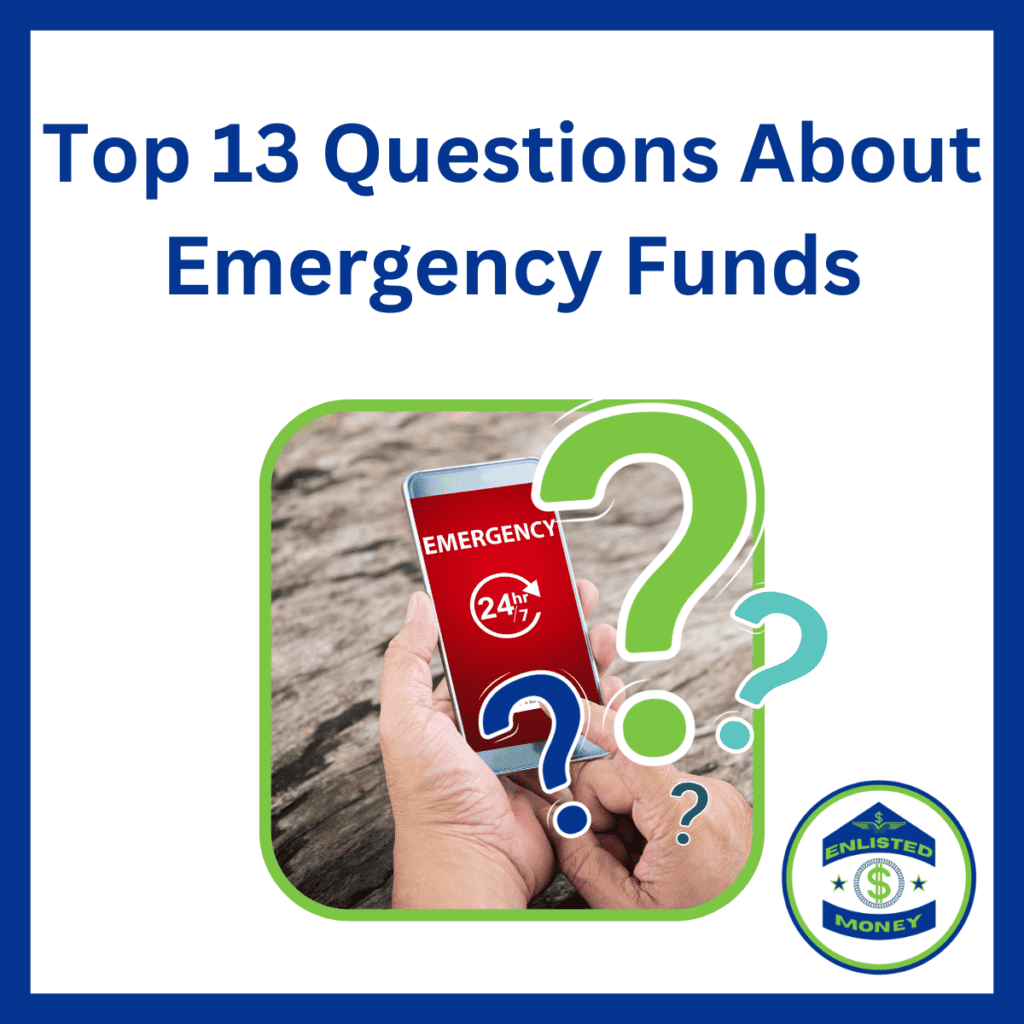
Do you have questions about emergency savings? Here are my answers to the top 13 questions an enlisted service member might have about emergency funds. Keep in mind, this is just my opinion and your personal situation may be different.
The biggest thing to me is that you actually have some type of emergency savings. If you don’t have an emergency fund established yet, please start today.
Top 13 Questions About Emergency Funds
1. How much should I ideally have in my emergency savings fund as a service member?
We started with the Dave Ramsey $1,000 starter emergency fund. This obviously doesn’t cover a lot of emergency expenses anymore. However, if you’re still in service, this is a great starting point. You do have the option to utilize one of the military aid societies which are listed on my resources page. I personally feel you should have at least three months’ worth of pay, or six months of expenses. I say three months of pay because there’s a pretty high likelihood an issue with your pay is the actual issue, not some external issue.
2. What are the consequences of not having enough emergency savings in the military?
The biggest problem with not having enough emergency savings is that it will distract you from what you’re supposed to be doing at work. Most employers could care less about what you have going on, so we’re pretty fortunate that the military understands the mental stress, anxiety, and distraction a financial emergency or hardship might have. If you have a good emergency fund established, you can handle the issue, take your time to come up with a plan and get back to the mission.
3. How can I start building an emergency fund on a limited military salary?
Just start with something. Even if you only start with $50 per month, you’d be surprised how much you’ll have saved up after a while. Every extra bit of cash you get, throw it in the emergency fund until it’s fully funded. Getting on a budget definitely helps with finding creating extra cash to save.
4. What are the common unexpected emergency expenses I should be prepared for as a service member?
I’d say the most common are going to be car repairs, having a pay issue (finance screwed something up), or unexpected moving expenses during a PCS.
5. Are there specific military programs or resources that can help me save for emergencies?
Absolutely! Your personal financial counselors on base are a great resource! I have links to the global personal financial counselor map and other programs on my resources page. They can help you get a budget started and look for ways you can trim expenses to get started building up an emergency fund.
6. What strategies can I use to prioritize emergency savings alongside other financial goals?
This is really tough – especially if you’re in debt trouble. If you’re going to miss a payment and take a hit on your credit, you definitely want to prioritize that, but then you need to figure out how to prevent that from happening again.
7. How can I balance saving for emergencies with paying off military-related debts?
You’re not going to have an option on how/if you pay on your debt to the military. Once you’ve been notified of a debt to the government, you’ll have an opportunity to elect for a payment plan. You can have a debt taken out all at once too. There’s a couple things to consider there. You will be paying interest, but it’s a pretty low rate.
8. Should I keep my emergency fund in a regular savings account or consider other options?
This is going to be an individual choice. For us, we keep a separate savings account at a bank that’s separate from our main checking account. We do keep a checking account at the bank too, so we can switch the money over and use it right away if needed. I’d suggest using a high-yield savings account so you can hopefully keep up with inflation a little bit.
9. What steps can I take to quickly build up my emergency fund if it’s currently insufficient?
I personally wouldn’t stress too much. Just make a budget and get a plan to build this up. For us, we actually used a tax return to finish building our emergency fund. If you really feel stressed about not having an emergency funds established, you can sell things or take on some short-term work (if your command allows it).
10. Are there any tax advantages or incentives for military personnel related to emergency savings?
Not really. I guess technically, our income is “artificially” low because of all the non-taxable benefits we get (basic allowance for housing (BAH)). This would translate to lower long-term capital gains taxes on the little bit of interest we’ll earn on our savings accounts.
11. How can I protect my emergency savings from unexpected financial setbacks or losses?
By definition, this is exactly when you would want to use your emergency fund. If you have to deplete your emergency fund, just start building it back up.
12. What types of insurance should I consider to complement my emergency savings?
Insurance is a whole different, yet related topic. What insurance allows you to do is transfer risk by paying an insurance company to take on the risk of an event occurring. Things to think about are if you have money to pay your deductible if you were to get into an accident. For us, we used to keep our deductibles lower so we didn’t have as many out of pocket expenses. However, once we established an emergency fund, we raised the deductible so we can save on our annual premium payments.
13. How can I ensure that my emergency savings are easily accessible in case of deployment or relocation?
For us, we keep a checkbook and debit card handy so either my wife or I can access funds easily after I transfer the funds. If you’re married, make sure you are both listed on this account so if you deploy, you don’t need to worry about a power of attorney or anything.
Do You Have a Question I Can Answer?
I hope this question and answer post was useful to you. If you have a question I can answer, please send me an email: questions@enlistedmoney.com
Make sure you download your free Get Started Checklist™ using the button below.
